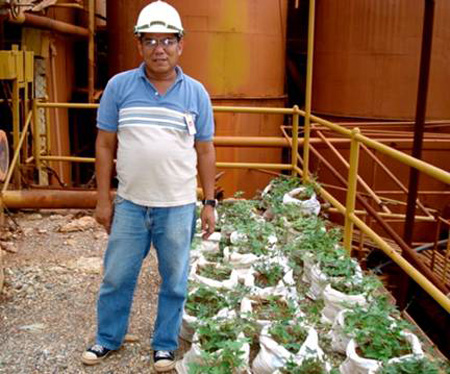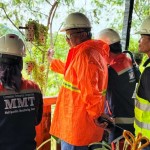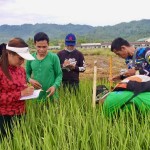Subanon women learn modern upland farming techniques
The Subanon women of Canatuan, like many of their counterparts in indigenous
communities all over the world, are taking their role as empowered members of
their tribe seriously. Traditionally taking the back seat, they have come forward
to help earn extra keep for their families. And slowly but surely, these women
are proving their mettle in modern upland farming, which is seeing more and
more of them attracted to its promise of more food on the table.
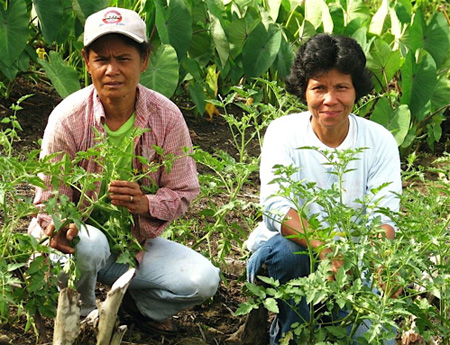
|
Sidai
Dandana (left) and Ana Combi. Through FAITH, “we have begun the change process and are actually already seeing positive changes in our lives.” |
Annabel “Ana” Combi and Zenaida “Sidai” Dandana are
among them. The president and area leader, respectively, of the 200-strong Siocon
Subanon Women’s Association, Inc. (SSWAI) are proud participants of Project
FAITH or Food Always in The Homes, a livelihood program supported by TVI Resource
Development Philippines, Inc. (TVIRD). The Project – spearheaded by Reynaldo
Carubio, TVIRD Mill Operations superintendent, and by the company’s Community
Relations and Development Office (CReDO) – aims to promote food self-sufficiency
in Canatuan by making vegetables, grains and, later on, poultry products available
to every household in Canatuan and the adjacent sitios. FAITH focuses on tapping
women to participate in upland agriculture without resorting to the traditional
Subanon slash-and-burn farming method.
Located in the mountainous eastern part of Siocon town in Zamboanga del Norte
in Mindanao, Canatuan’s terrain is well suited for wide varieties of upland
rice and vegetables.
Like their husbands, the women were given training on contour farming, vegetable
gardening, and the use of organic fertilizer through composting. CReDO has produced
and distributed materials that provide useful information on basket composting,
vegetable gardening or camote (sweet potato) planting. Thess Limpin, CReDO manager,
has also distributed vegetable seedlings to the women even as she personally
monitors the progress of the project. CReDO will also seek market linkages so
the women can sell their surplus farm produce.
“FAITH also allows plenty of time for me to bond with my children,”
Ana says. Always reporting for work at 7:00 a.m. as a CReDO community facilitator,
she is usually home by 3:30 p.m. In-between her responsibilities as employee
and SSWAI president, Ana still finds time to take care of her two youngest children,
aged five and nine, and to assist her husband, Jerry, in tending to their upland
rice and vegetable farms. Her six other children are already grownups. And so
with the smallest ones in tow, she attends to her farm full of eggplants, radishes,
ampalaya (bitter gourd), alugbati (spinach), string beans, and varieties of
gabi (taro) and camote. On Sundays, her rest day, she can be seen either planting
or weeding in their upland rice farm with her kids.
“We always bring our children when we work in the farm, especially these
little ones,” Ana relates. “We want to instill in them the appreciation
for the fact that farming was the traditional livelihood source of our tribe;
that working together, like playing at home, is fun.”
Jerry, 49, works full time in their farm. He also doubles up occasionally as
a carpenter in the community to earn additional income. Just more than two weeks
ago, the Combis were able to harvest 24 sacks (or about 1,200 kilograms) of
upland rice from just a ganta (2.24 kilograms) of rice seedlings. The couple
also earns from the bananas and cassava fruits that abound in the farm they
have been tilling since 2005.
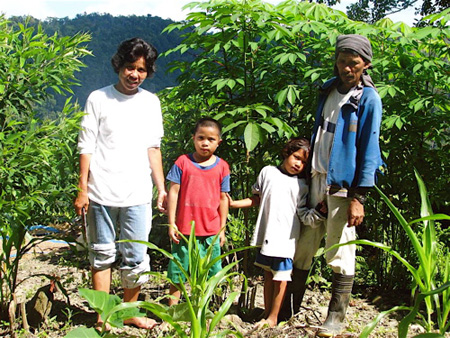
|
Ana
and Jerry with youngest children Jemuel, 9, and Joyce Anne, 5: “We want to instill in them the appreciation for the fact that farming was the traditional livelihood source of our tribe; that working together, like playing at home, is fun.” |
With her salary and farm earnings, Ana was able to send her eldest daughter
to vocational school. Jennifer, 23, just finished last March her Office Professional
Specialist course, which she took in one of the colleges in Zamboanga City.
“I cannot believe that we were able to send Jennifer to further studies
after high school,” Ana says. This is quite a feat in her village where
in the past, poverty often prevented young people from even attending high school.
The rest of her brood are still either in high school or in elementary school.
Ana wants all of them to finish college and she says TVIRD is helping her realize
that dream. With her salary and the potential to earn additional income from
the sustainable farming techniques that she and other SSWAI members have learned
from FAITH, Ana is confident that her dream is not far-fetched.
“With FAITH, we also are able to help protect the environment,”
she adds, referring to Carubio’s emphasis on the need to stop swidden
farming. “I love my work as community facilitator. Each night, I am contented
to sleep knowing that I have done my share in educating my fellow Subanons on
responsible mining and sustainable farming,” she said.
Sidai, on the other hand, is more at home with the ideals of FAITH as farming
has really been her family’s main livelihood source. Before the coming
of TVIRD to Canatuan and the introduction of FAITH, however, their income from
the farm was not enough to send all of their six children to college. She and
husband Alito managed to see their eldest, Gemma, through her bachelor’s
degree in Forestry only with the help of relatives. The rest of the children,
all boys, had to stop studying after high school.
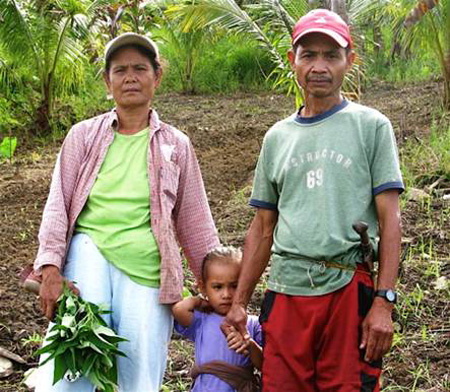
|
Sidai and Alito, with their granddaughter Kia: “With the additional income from my farm, I can now start saving for the time when all my children will leave us, or when TVIRD ends its operations here.” |
Fortunately, Alito, daughter Gemma, and sons Greg and Roger got hired by the
company. The additional income enabled the family to fund the college tuition
of Florian, the youngest child, who finished Criminology last year.
Looking back, Sidai, now 53, says it was already easy for them to send Florian
to college because of Alito’s salary from the company and the income they
receive from their farm. She said poverty and inspiration from Alito taught
her to engage in farming herself by planting more upland rice, bananas and vegetables.
Smiling, she adds that this year she expects more income from the farm now
that FAITH is being implemented by SSWAI.
“FAITH taught us the hillside farming techniques through contouring and
the production of organic fertilizer through composting. Imagine, we now produce
fertilizers from radish, squash or upo (white squash) peelings! The added bonus
is that we were given free vegetable seedlings as our seed capital for producing
more vegetables on our own,” she says. “With the additional income
from my farm, I can now start saving for the time when all my children will
leave us, or when TVIRD ends its operation here.”
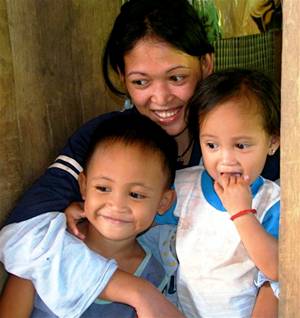
|
Maria Fe Pinero and her kids, John Paul, 4, and Krizel, 2. Like Ana and Sidai, Fe is enjoying her involvement in FAITH. “Our children have become involved and learning much along the way,” says Sidai. |
Carubio says FAITH does not require the participants’ full-time attention.
“Only 30 to 60 minutes are needed each day from the families,” he
explains. “But it will yield more than enough vegetable supply –
more than 10 different varieties, including root crops – for a family
of six.”
TVIRD’s Human Resources and Administration (HRA) also plays an important
role in FAITH. According to Yulo Perez, TVIRD Vice President for Philippine
Operations, HRA is, at the moment, the “main market” for FAITH’s
excess farm produce. The company’s Canatuan mess hall, where employees
and visitors are fed, purchases the vegetables of FAITH participants.
Perez and Carubio are confident that by year-end, mess hall requirements for
vegetables and meat products will be sufficiently supplied by the project and,
as such, the company need not go to town centers to purchase its food requirements.
Ana, Sidai and other FAITH participants like them still have a long way to
go before realizing the project’s potential for sustainability. They are
aware that a lot of things need to be done to change old ways of thinking, such
as fatalism (just waiting things to happen), and old ways of doing things, such
as swidden farming, which they inherited from older generations of Subanons.
“What is important is that we have begun the change process and are actually
already seeing positive changes in our lives,” Siday says. “And
our children have become involved and learning much along the way.” (Lullie
A. Micabalo)
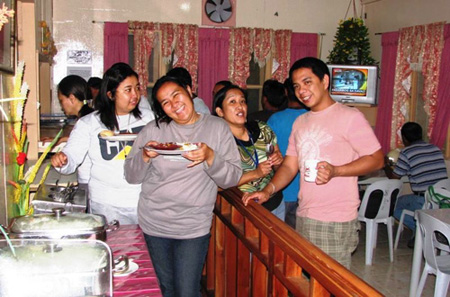
|
Above, TVIRD’s mess hall for employees in Canatuan is, at the moment, the main market for FAITH’s farm produce. TVIRD Mill Operations Superintendent Rey Carubio, a licensed electrical engineer whose other love is farming, is one of the prime movers of FAITH. He believes that by year-end, all vegetable and meat requirements of the mess hall can be sourced from FAITH participants. |
